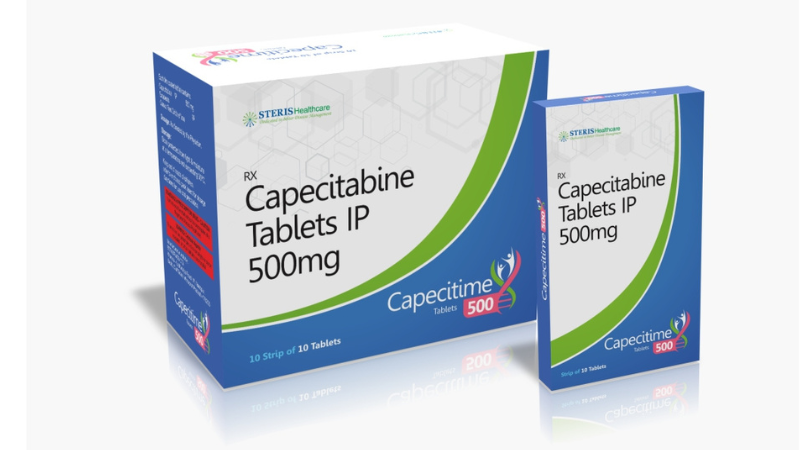Unlocking the Potential of Capecitabine LP (500mg) in Cancer Treatment
Mar 04, 2024
Capecitabine lp (500mg)
If you've been prescribed the capecitabine 500 mg tablet, you probably have questions about how it works, what to expect, and how to manage your treatment journey. Sold under the brand name CAPECITIME 500, this oral chemotherapy drug is widely used in treating various cancers. Understanding how capecitabine works and what it does in your body can help reduce anxiety and build confidence as you begin or continue your therapy.
The capecitabine 500 mg tablet is a powerful yet targeted medication designed to attack cancer cells while being more convenient than traditional IV chemotherapy. At Steris Healthcare, we manufacture CAPECITIME 500 with a focus on safety, consistency, and patient accessibility.
What is Capecitabine 500 mg Tablet?
CAPECITIME 500 contains capecitabine, an oral chemotherapy medication used to treat:
-
Breast cancer
-
Colorectal cancer
-
Stomach (gastric) cancer
It is a trusted form of capecitabine tablets IP 500mg, commonly prescribed when intravenous chemotherapy is not preferred or in combination with other cancer treatments.
Many patients find tab capecitabine 500mg more manageable than hospital-administered treatments, as it allows them to continue therapy at home with less disruption to their daily life.
How Does Capecitabine Work?
Understanding the capecitabine mechanism of action can help you appreciate how this drug targets cancer:
-
Once you take the capecitabine 500 mg tablet, your body converts it into 5-fluorouracil (5-FU), a powerful chemotherapy agent.
-
5-FU interferes with the DNA synthesis of cancer cells, blocking their growth and leading to cell death.
-
Because the conversion happens more within cancerous tissue, it can help minimize harm to healthy cells.
This targeted approach is one reason capecitabine 500 is widely used in modern oncology.
Capecitabine Side Effects – What You Should Know
While capecitabine 500 mg tablet is effective, like all chemotherapy drugs, it may cause side effects. Being aware helps you manage them proactively.
Common Capecitabine Side Effects:
-
Nausea or vomiting
-
Diarrhea
-
Fatigue
-
Loss of appetite
-
Mouth sores
-
Redness, swelling, or peeling of palms and soles (hand-foot syndrome)
Serious but Less Common:
-
Chest pain
-
Blood in stool
-
Signs of infection (fever, chills)
-
Severe diarrhea or dehydration
Always notify your doctor if any symptoms worsen or interfere with your daily activities.
What to Avoid While Taking Capecitabine
When you're on tab capecitabine 500mg, follow your doctor’s advice and keep these precautions in mind:
-
Avoid alcohol – it can worsen side effects like nausea or liver irritation.
-
Limit sun exposure – capecitabine can make your skin more sensitive to sunlight.
-
Do not take folic acid supplements unless prescribed.
-
Avoid grapefruit juice – it can affect how the drug is metabolized.
-
Check with your doctor before using any new medications, including herbal remedies.
Patient Tips for Taking Capecitabine Tablets IP 500mg
-
Take the medication within 30 minutes after a meal.
-
Swallow the capecitabine 500 mg tablet whole—do not crush or chew.
-
Stay well hydrated and maintain a balanced diet.
-
Track your symptoms and share updates with your healthcare team.
-
Rest when needed; fatigue is common but manageable.
Why Choose Steris Healthcare’s CAPECITIME 500
Steris Healthcare ensures that CAPECITIME 500 is:
-
Manufactured under WHO-GMP certified standards
-
High-quality, safe, and effective for cancer therapy
-
Affordable and accessible for long-term treatment
-
Available nationwide with timely delivery
Patients trust Steris Healthcare for genuine capecitabine tablets IP 500mg that provide safe and effective chemotherapy support.
Frequently Asked Questions
1. Is capecitabine a strong chemotherapy drug?
Yes, capecitabine 500 mg tablet is a potent oral chemotherapy agent effective against breast, colorectal, and gastric cancers.
2. What to avoid while taking capecitabine?
Avoid alcohol, live vaccines, and unapproved medications. Follow your oncologist’s dietary and medication guidance.
3. How does capecitabine work?
It converts into 5-FU in cancer cells, inhibiting DNA/RNA synthesis and slowing tumor growth.
4. Can it be taken long-term?
Yes, under strict supervision and monitoring by your oncologist.
5. What are common side effects?
Nausea, diarrhea, hand-foot syndrome, fatigue, and loss of appetite; serious reactions are rare.
Final Thoughts
Capecitabine 500 mg tablet gives patients more control and comfort during cancer treatment. It is a strong, targeted chemotherapy medication that can be taken at home while being effective in slowing or stopping cancer growth.
Stay informed, stay empowered, and talk to your healthcare provider about whether CAPECITIME 500 is right for your treatment plan.
Recent Post

How Citicoline and Piracetam Work Together for Brain Power

How to Apply Clindamycin Nicotinamide Gel Correctly

Best Keratin and Biotin Shampoo for Men & Women | DANDROPHYTE

How Ferric Pyrophosphate Syrup Boosts Hemoglobin Faster Than Regular Iron

Tedizolid Phosphate 200 mg: A Potent Option for Resistant Skin Infections

How Misoprostol 200 mcg Tablets Help Prevent Ulcers and Control Bleeding

How Erdosteine 300 mg Capsules Help Clear Phlegm and Improve Breathing

Why Rabeprazole + Cinitapride is the Best Combo for Indigestion and Heartburn

strawberry face wash : uses,benefits and more

Metformin Alone vs. Combination with Glimepiride: Which is Better for You?

